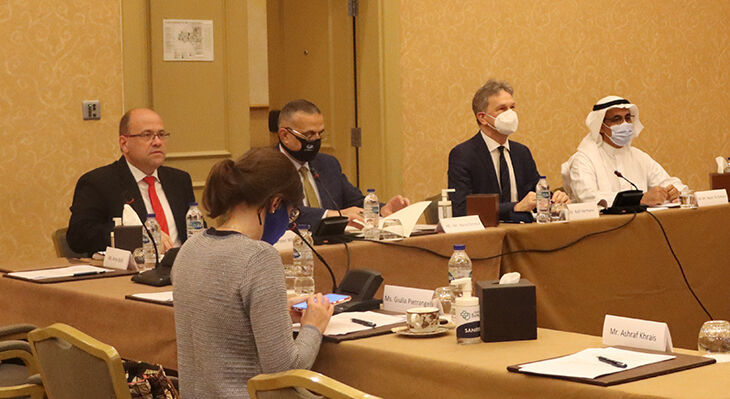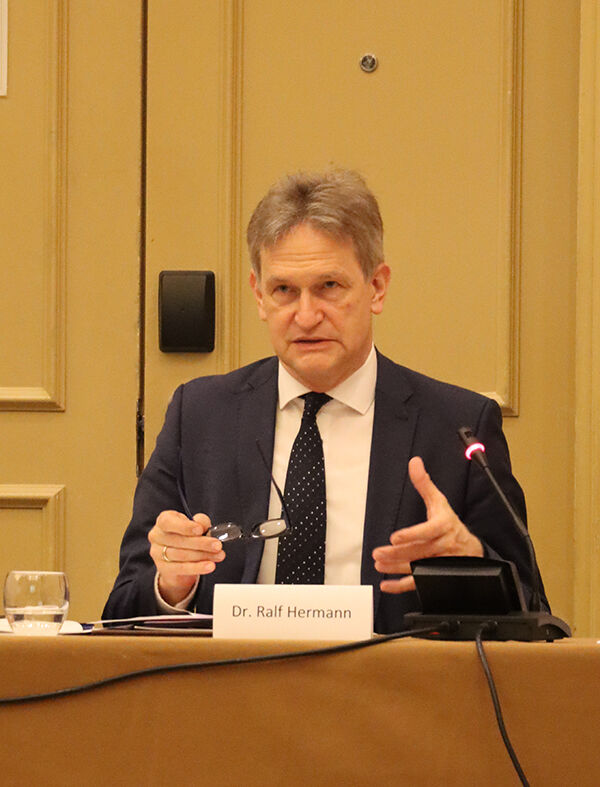OECD Development Assistance Committee enters into VET dialogue with Arab donor group
11.04.2022
A new working group on Employability and Vocational Training was officially launched in Dubai at the end of February as part of the Arab-DAC Dialogue on Development. In its capacity as Co-Chair, GOVET will be supporting the exchange between Arab and OECD donors by bringing German VET expertise to bear.

The Arab Gulf States have now become some of the largest donors in the world in the fields of development cooperation and humanitarian aid. For this reason, networking with Arab donor organisations is a high priority for the members of the Development Assistance Committee (DAC) at the Organisation for Economic Co-operation and Development (OECD).
The Arab-DAC Dialogue on Development has emerged as an important forum since 2009. Participants comprise OECD member states and members of the Arab Coordination Group (ACG). The latter consist of the state development funds of Qatar, Kuwait, Saudi Arabia and the United Arab Emirates and also include multilateral donors. Members convene once a year to discuss development policy topics and experiences.
At the last such annual meeting in February 2021, participants in the Dialogue Forum took the decision to set up a new Task Force entitled Employability and Vocational Training. The aims of this Task Force are to foster policy dialogue in this area and to facilitate the implementation of joint projects.
In the Arab-DAC Dialogue on Development, Task Forces are equally chaired by an OECD-DAC member country and an Arab donor organisation. The Federal Ministry for Economic Cooperation and Development (BMZ) has proposed the German Office for International Cooperation in Vocational Education and Training (GOVET), which is based at BIBB, to represent Germany as the Co-Chair of the working group. Co-chairship on the Arab side will be assumed by the Arab Gulf Programme for Development (AGFUND), a multilateral programme operated by the Arab Gulf States.
A special inaugural meeting to instigate the Task Force was held in Dubai on 24 February 2022. The two co-chairs, represented in the persons of Nasser Al Kahtani, Managing Director of AGFUND, and GOVET’s Head Dr. Ralf Hermann, both participated. They were joined in a hybrid event by Arab donor organisations and by representatives from the DAC member states.
Vocational education and training for young people and women

The co-chairs and the German Agency for International Cooperation (GIZ) used the kick-off meeting to present the Task Force’s schedule for the next two years and to address other interested members. Two of the main focuses of the Task Force will be to increase employability and to support access to vocational education and training. There will be a particular emphasis on young people and women in the MENA region. The states in the region face a major development policy challenge because of the prevailing level of youth unemployment coupled with economic collapse and the discontinuation of school education and VET as a result of the coronavirus pandemic. GOVET Head Dr. Hermann stressed that attractive and labour market-related initial and continuing training formed the basis both for sustainable company development and for robust national economies. It is also a foundation for promising education and employment biographies and thus contributes to societal participation and stability.
Joint commitment to sustainable and fair development
The GIZ organised and hosted the event on behalf of the BMZ, acting in conjunction with the OECD Development Co-operation Directorate in this regard. Carsten Wilms, Deputy Head of Mission at the Embassy of the Federal Republic of Germany in Abu Dhabi, praised the strong involvement of BIBB, GOVET and the GIZ in the Task Force. He stated that this was a fine example of German commitment in the region.
The improvement of VET systems is a central focus of German development cooperation, especially in the MENA region and in Africa. Germany’s commitment to this Task Force provides clear evidence of our country’s readiness to engage jointly with the Arab donor community.
The participants in the inaugural meeting all agreed that triangular cooperation incorporating close integration of partner countries in the MENA region could be particularly successful partnership models. For this reason, the intention is that the activities undertaken by the Task Force should also build on strategies and initiatives by partner countries which are already addressing the further development of vocational education and training and which view VET as a development priority. A principal objective is to strengthen broader involvement in the governance, financing and practice of national training systems in a way which also integrates the private sector and the employee side.
Jorge Moreira da Silva, Director of the Development Co-operation Directorate at the OECD, spoke about the creation and quality of jobs.
It is important to secure a just recovery for all. Strengthening development cooperation and encouraging private investors for sustainable development can be of assistance in this respect.
He also highlighted the necessity of collaboration with the private sector and with companies in order to promote the employability of young people. The Task Force will seek to move beyond policy dialogue to enable the implementation of projects aimed at strengthening VET.
The activities planned by the Task Force will also contribute to fulfilment of the sustainable development goals (SDGs) set out by the United Nations, in particular SDG 4 (Quality education) and SDG 8 (Decent work and economic growth). The Task Force will also endeavour to pursue SDG 17, which calls for partnerships for sustainable development.